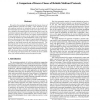Free Online Productivity Tools
i2Speak
i2Symbol
i2OCR
iTex2Img
iWeb2Print
iWeb2Shot
i2Type
iPdf2Split
iPdf2Merge
i2Bopomofo
i2Arabic
i2Style
i2Image
i2PDF
iLatex2Rtf
Sci2ools
234
Voted
ICNP
1996
IEEE
1996
IEEE
A Comparison of Known Classes of Reliable Multicast Protocols
We analyze the maximum throughput that the known classes of reliable multicast protocols can attain. A new taxonomy of reliable multicast protocols is introduced based on the premise that the mechanisms used to release data at the source after correct delivery should be decoupled from the mechanisms used to pace the transmission of data and to effect error recovery. Receiver-initiated protocols, which are based entirely on negative acknowledgments (NAKs) sent from the receivers to the sender, have been proposed to avoid the implosion of acknowledgments (ACKs) to the source. However, these protocols are shown to require infinite buffers in order to prevent deadlocks. Two other solutions to the ACK-implosion problem are tree-based protocols and ring-based protocols. The first organize the receivers in a tree and send ACKs along the tree; the latter send ACKsto the sender along a ring of receivers. These two classes of protocols are shown to operate correctly with finite buffers. Followi...
Computer Networks | ICNP 1996 | Receiver-initiated Protocols | Reliable Multicast Protocols | Tree-based Protocols |
Related Content
| Added | 07 Aug 2010 |
| Updated | 07 Aug 2010 |
| Type | Conference |
| Year | 1996 |
| Where | ICNP |
| Authors | Brian Neil Levine, J. J. Garcia-Luna-Aceves |
Comments (0)

